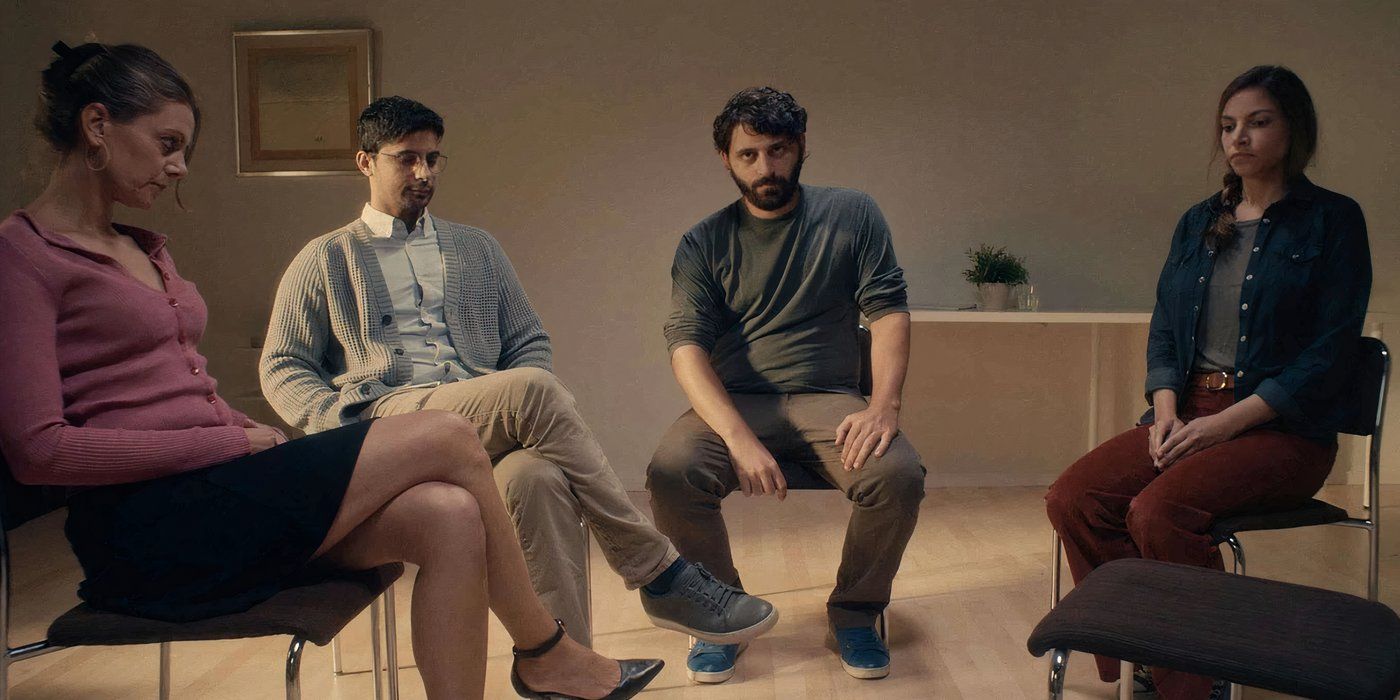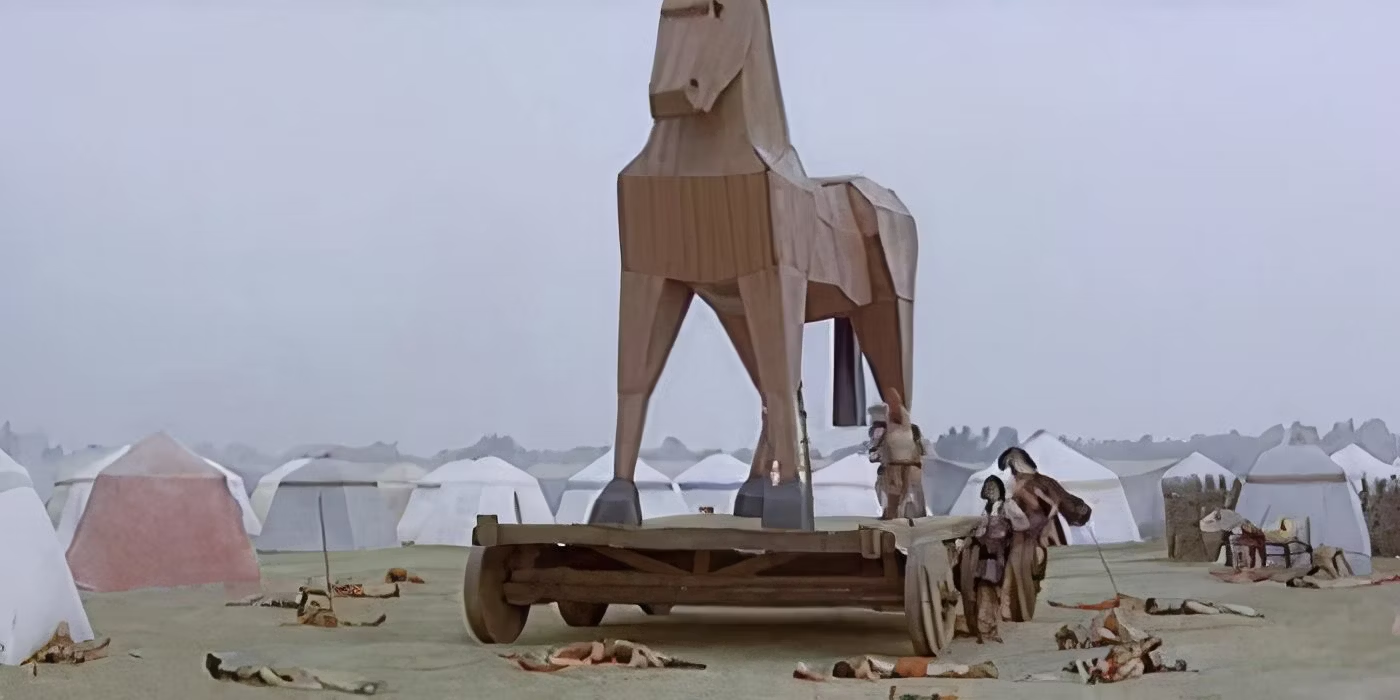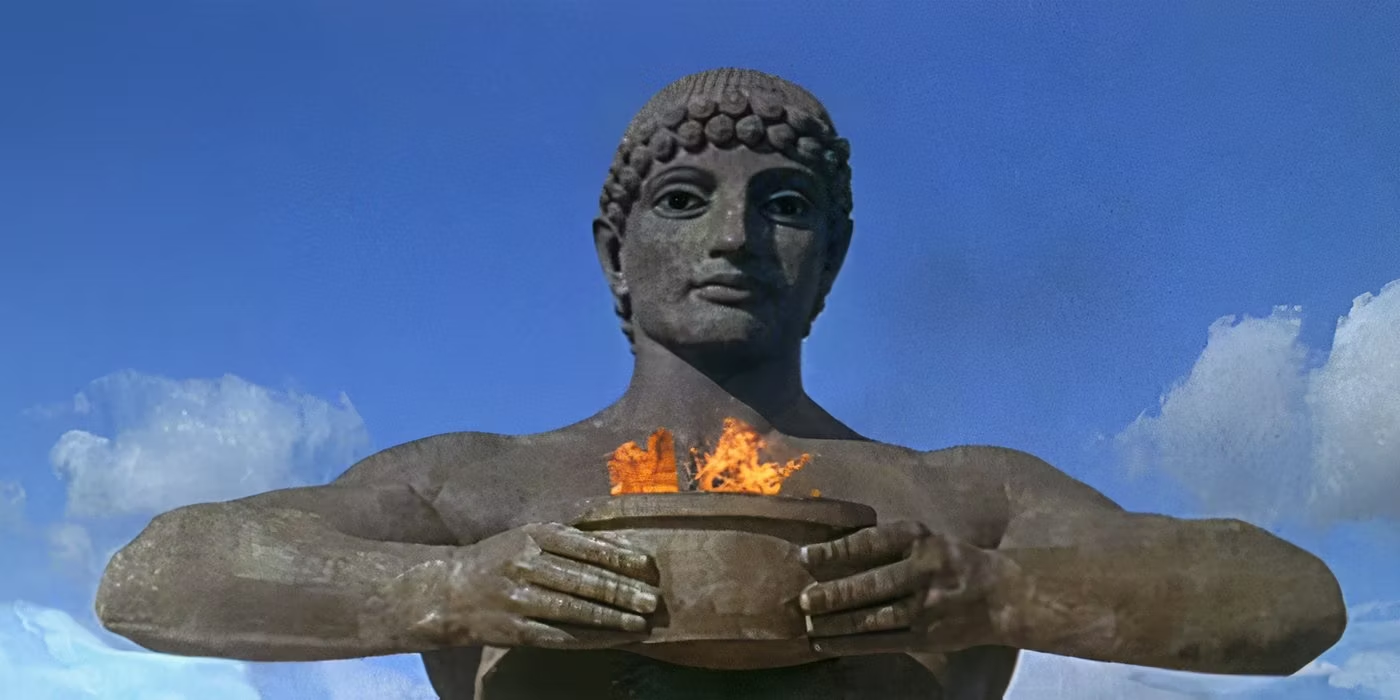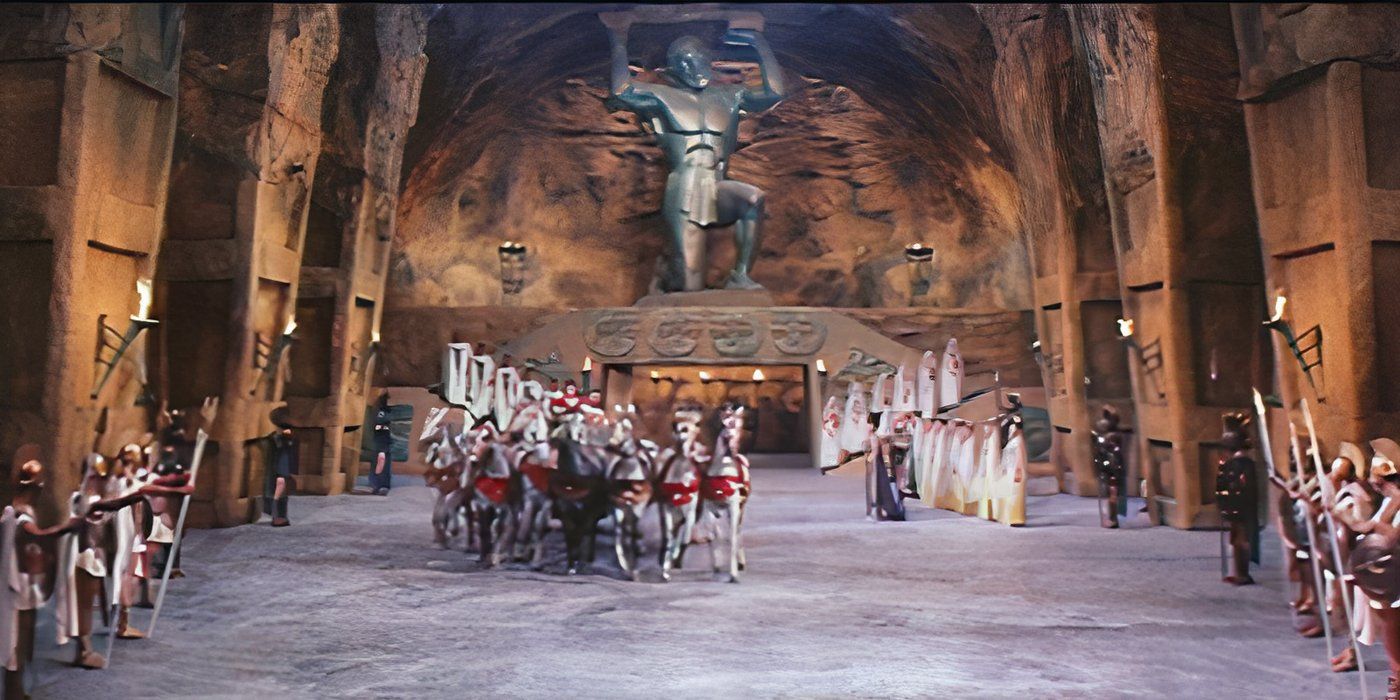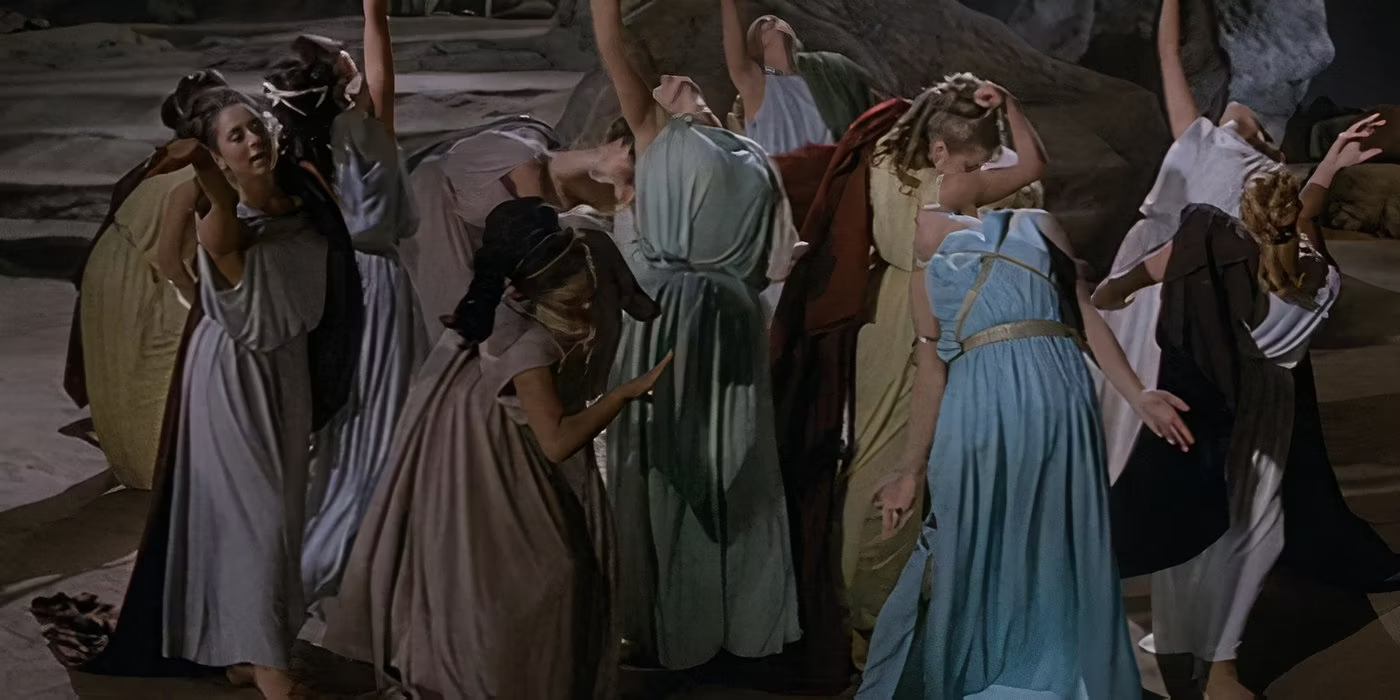There is something indelibly appealing about Greek mythology movies, from classics like Spartacus to more recent fare like Troy (2004). Incorporating imaginative elements into the sincerity of religion, they are magical realism of the highest order, wherein humans coexist with monsters. The gods were as flawed as humans, making them relatable. They were vain and vengeful, inviting convoluted and operatic drama. Further, Angient Greek civilization was a highpoint of ancient civilization. Their grandiose stories and lives will perpetuate them in eternity – a point proven by how epic in scale so many timeless movies based on Ancient Greek myths are.
Many modern storytelling tropes can be traced to ancient Greek mythology; from the epic journey of Odysseus to the fable of Orpheus and Eurydice, themes of tragedy, triumph, love, and loss are common in these ancient tales. They’ve proven to be fertile grounds for Hollywood. Not every big-budget interpretation of Greek mythology has succeeded, but the best Greek mythology movies include the most memorable action films on the big screen. From Disney fantasy epics to ambitious, carnage-filled comic book reimaginings, plenty of influential Hollywood projects have been based on stories and themes thought to originate in Ancient Greece.
20 The Odyssey (1997)
A Retelling Of Homer’s Odyssey
Clocking in at roughly three hours, The Odyssey can be viewed as a long movie or a two-part miniseries. A terrifically truthful adaptation of the Greek myth of Odysseus, the film recounts his 10-year journey home after the events of the Trojan War. As with many examples of ancient Greek mythology, the tale of Odysseus is long, complex, and full of allegory, and the 1997 film adaptation pulls no punches, including almost every aspect of the original story.
The original miniseries on NBC was an award winner, bringing home the Primetime Emmy Award for Outstanding Directing for a Miniseries or Special for Andrei Konchalovsky.
It’s a lengthy watch and a lower-budget offering, but it has the added charm of using Jim Henson’s Creature Shop for many of its creature effects. However, it’s so detail-rich that it could pass as a documentary of the original Homer myth. The original miniseries on NBC was an award winner, bringing home the Primetime Emmy Award for Outstanding Directing for a Miniseries or Special for Andrei Konchalovsky.
19 The 300 Spartans (1962)
Recreating The Battle Of Thermopylae
Zack Snyder’s stylish 2006 epic 300 may have served more directly as an adaptation of the 1998 comic series of the same name, but it also borrowed somewhat from 1962’s The 300 Spartans. Frank Miller, who wrote the 300 comic series, said he saw this movie as a child, and “it changed the course of my creative life” (via NY Post). The 300 Spartans isn’t quite as popular as some other Greek mythology movies in the genre, though it’s nonetheless worthy of recognition.
A recreation of the Battle of Thermopylae fought between Xerxes I and King Leonidas, The 300 Spartans features surprisingly large-scale battle sequences and enough intrigue to keep modern audiences engaged. The movie did a lot to make it seem as realistic as possible by filming much of it in Greece, although it mostly focuses on melodrama and the soldiers involved in the giant war.
18 Helen Of Troy (1956)
A Movie Based On Homer’s Iliad & Odyssey
Though a few (mostly silent) films preceded it, the 1956 movie Helen of Troy is notable for being one of the earliest Greek mythology movies based on The Illiad and The Odyssey. The plot follows the same large strokes as the source material, though it paints the Greek kings in a poorer light to build up the love-story elements of Helen and Paris. Critics received it relatively well and primarily praised some of the set pieces (including the famous Trojan Horse trick).
What the movie has going for it is the direction of Robert Wise (the Oscar-award-winning director of West Side Story and The Sound of Music). The main story is about the Trojan War and the moment that Paris of Troy meets and falls in love with Helen, Queen of Sparta. This leads to their stance in the middle of the war and Paris’s eventual fall when he battles Menelaus, the Spartan King. While it looks perfect, shot in Italy, the original story’s drama is mostly missing from this in favor of romantic melodrama.
17 Oedipus Rex (1967)
Based On The Sophocles Greek Tragedy
Based on Sophocles’s Greek tragedy, Oedipus Rex is an Italian movie directed by Pier Paolo Pasolini. The film follows Oedipus (Franco Citti) as he is abandoned in the desert as a child and rescued by a loving king and queen. He grows up and learns from the Oracle of Delphi about the prophecy that he will kill his father, King Laius (Luciano Bartoli), and marry his mother, Queen Jocasta (Silvana Mangano).
The movie’s first half is a prologue to the play and created by Pasolini himself.
Though much of the dialogue is faithful to the play, Oedipus Rex is set in Pasolni’s native country of Italy, giving it a personal touch. The movie’s first half is a prologue to the play and created by Pasolini himself. However, the entire second half of the movie is completely and faithfully adapted from the original Sophocles play. The film screened at the 28th Venice International Film Festival and was nominated for the prestigious Golden Lion Award.
16 Antigone (1961)
A Movie Following The Oedipus Story
Though Antigone was released six years before Oedipus Rex, it’s another Sophocles tragedy that serves as a sequel, taking place after Oedipus exiled himself. Directed by Yorgos Tzavellas, the film sees Antigone (Irene Papas) fight to see her deceased brother Polynices buried after King Creon (Manos Katrakis), another of her brothers, denies Polynices’ burial rights for killing their eldest brother Eteocles.
Antigone is one of the best Greek mythology movies because, while it may be a sweeping tale, it’s ultimately a dysfunctional family story, often making for the best drama. Tzavellas’ movie is a smart story that tracks political power and resistance to it, which was a hard sell in Sophocles’s day, as many of his stage plays were banned from performances, although this was a rare one that wasn’t. The movie adaptation of the play won the Samuel Goldwyn International Award at the Golden Globes.
15 The First King: Birth Of An Empire (2019)
A Movie About Romulus & Remus
The First King: Birth of an Empire is an Italian historical drama film starring Alessandro Borghi and Alessio Lapice. The First King is based on the famous Romulus and Remus myth, the two shepherd brothers raised by a She-Wolf. In the movie, Romulus and Remus take a journey that leads them to discover a new nation and encounter a dark betrayal.
The movie received positive praise from critics, re-telling the mythological story that originated with the image of the She-Wolf and the twin boys in their infancy. Romulus became the legendary founder and first king of Rome. For fans who love Greek mythology movies, this has one unique detail that adds to its accuracy. Director Matteo Rovere made the movie using archaic Latin, although the language was created by a team from the University Guglielmo Marconi (via Classical Reception).
14 O Brother, Where Art Thou? (2000)
The Coen Brothers Remake Homer’s The Odyssey
The Coen Brothers movie, O Brother, Where Art Thou?, is one of the Greek mythology movies based on the epic poem The Odyssey by Homer. It is a satirical story by the Coen Brothers that incorporates many elements from the iconic poem. The George Clooney-starring film follows Ulysses Everett McGill, who escapes from a prison chain gang and goes on the run in rural Mississippi.
While there, he meets with Delmar and Pete. The trio goes on a journey to find a treasure before it is lost forever after the area is flooded to make a lake. During this process, they meet several eclectic characters, encounter many obstacles, and undertake adventures. The movie is only loosely based on the poem, as it is a satire incorporating elements from the original story. The movie earned two Oscar nominations (Adapted Screenplay and Cinematography) and won two Grammy Awards (Album of the Year, Best Soundtrack).
13 Immortals (2011)
Tarsem Tells The Story Of Theseus
The visuals of 2011’s Immortals are undeniably engaging, with decent scope and enthusiasm. Yet, like the similar film 300, it contains fairly graphic violence. However, the dark cinematography in Immortals can feel a bit dull by comparison. The story itself bears little resemblance to other Greek mythology movies and instead plays in that sandbox. This movie has amazing visuals, which is expected from Tarsem, the director behind visual masterpieces like The Fall and The Cell.
This movie shows King Hyperion searching for the bow that is supposed to release the powerful, traitorous Titans after the Twelve Olympians imprisoned them. Theseus is a man fated to stand up against Hyperion, while the Greek Gods are bound by Zeus not to interfere unless the Titans are released. This leads to the Titans’ release, the fall of the gods, and the eventual legend of Theseus. Anyone looking for accuracy in the Greek myths should look elsewhere, but the visuals here are worth the watch.
12 Medea (1969)
Based On Jason And The Argonauts & Euripides’ The Medea
Medea, an Italian movie directed by Pier Paulo Pasolini, is one of the Greek mythology movies that interprets the famous Greek myth Jason and the Argonauts. The film is named after one of the story’s essential characters, Medea, who is betrayed by Jason and eventually seeks revenge on him and his family. The movie was considered particularly notable by critics for the excessively bleak handling of its subject matter and refusal to shy away from the grimmer parts of the original myth.
Famous Italian singer Maria Callas leads the cast of Medea in her only acting role. Concerning its accuracy, Medea is mostly a loyal retelling of Jason and the Argonauts and Euripides’ play The Medea. However, the movie doesn’t use the same dialogue as Euripides’ play, but the plot still follows it closely. The journey of Jason to Colchis is also loyal to his story as well. The movie also didn’t shy away from the tragic ending.
11 Hercules (2014)
The Rock Stars As Hercules
This film subverts expectations of the genre at every turn, essentially turning fantasy into a recurring joke. Hercules purports to explain how misinterpretations could result in wild speculation and subsequent legends of fantasy. Those who love that aspect of Greek mythology movies will be left disappointed. Part of that, though, is that, like 300, Hercules is based on a comic book, in this case, Steve Moore’s graphic novel Hercules.
The story has a lighthearted, juvenile tone, perhaps befitting of its director, Brett Ratner. However, the adventure is buoyant and quick, and Dwayne “The Rock” Johnson plays the titular hero well. Though his acting chops aren’t always top-tier, he does have plenty of charisma and the right physique. He sells the role with sincere enthusiasm and elevates the story with his presence. The movie was a box office success, carried by Johnson’s star power.
10 Orpheus (1950)
A Modern Retelling Of Orpheus
A French film that works as a modern retelling of the tragedy of Orpheus and Euridice, 1950’s Orpheus is convoluted, strange, and tough for non-French-speaking audiences to decipher. However, it works as an important arthouse endeavor that would come to define French cinema in the 1950s. When the titular character’s wife is killed by a personification of Death, he is forced to traverse the netherworld to return her to the land of the living. Like O Brother, Where Art Thou?, it uses the original as a template.
The movie was iconic and was turned into an opera.
Orpheus is unquestionably a great avant-garde movie, but it remains a striking and well-realized reinterpretation of ancient Greek mythology films. The movie is also part of a trilogy, the middle movie between The Blood of a Poet (1930) and Testament of Orpheus (1960), considered The Orphic Trilogy.Orpheus was iconic and was turned into an opera, first by the legendary Philip Glass in 1993 and then later in 2007 by Anne Manson.
9 300: Rise Of An Empire (2014)
The Sequel To Zack Snyder’s 300
Like its predecessor, 300: Rise of an Empire is one of the Greek mythology movies that leans further into fantasy. However, even for all its visual hyperbole, that first outing only carried hints of fantasy. Everything set in front of an ocean backdrop, including the corresponding action sequences, is inherently beautiful. The brutality fits in that harsh, storming weather. However, the protagonist is the film’s weakest part, which is massively detrimental considering how popular Gerard Butler’s Leonidas has remained in pop culture.
The true point of intrigue is Eva Green, whose Artemisia is both sympathetic and a magnetic villain. The movie doesn’t just follow the events of 300 but instead shows what happened before, during, and after the Battle of Artemisium and the Battle of Salamis. However, several historical inaccuracies in the movie make this play fast and loose with real-life events. Darius didn’t die in the way he did in the film, and neither he nor Xerxes was even at the Battle of Marathon.
8 Spartacus (1960)
Stanley Kubrick’s Epic Greek Retelling
A movie more or less disowned by director Stanely Kubrick owing to apparent disagreements with star Kirk Douglas, 1960’s Spartacus is nevertheless revered as a classic within the genre of Greek mythology movies. A romanticized version of historical events, Spartacus chronicles the life of its titular character as he stages a revolt against a corrupt Roman Empire. Douglas stars as Spartacus, an enslaved Thracian who rises up in a rebellion against Roman dictator, Crassus.
A must-see film for fans of Greek mythology.
Replete with love, triumph, and tragedy, it’s a must-see film for fans of Greek mythology, though it doesn’t remain accurate to the classic stories. It’s perhaps best known for its epic battle scenes that, in some instances, demanded thousands of extras on set. While Scorsese rejected the finished movie, it was a huge success, winning four Oscars with six nominations. It was also honored with its entry into the National Film Registry by the Library of Congress in 2017.
7 Iphigenia (1977)
Based On The Euripides Play Iphigenia at Aulis
Iphigenia is the third of director Michael Cacoyannis’s Greek mythology movies and is also the best-received. This film is based on Euripides’ stage play of the same name and follows the titular Iphigenia, the daughter of Agamemnon and Clytemnestra (the sister of Helen of Troy), as she and those around her deal with challenging questions of life, duty, and faith. After men offend the goddess Artemis, she orders Agamemnon to sacrifice his daughter.
The dramatic story focuses on questions of faith and responsibility, although Cacoyannis made several changes to the play’s story to make it work better as a movie. He adds new characters not in the original play but mentioned at different points, with Odysseus and Calchas as examples. However, Cacoyannis follows Euripides’ lead and keeps the ending ambiguous. Although Iphigenia dies at the movie’s end, it chooses not to show if the gods saved her, leaving it open for interpretation.
6 Hercules (1997)
Disney’s Take On A Famous Greek God
In 1997, Disney Animation added Hercules to its line of impressive movies. The songs in Hercules hold up to everything else in the Disney Renaissance, and the characters are equally memorable. Hercules may be a typical outcast, but his determination and craftiness are fun. Meg is one of the greatest female characters in the Disney canon, with charming sarcasm, empathy, and independence. Further, the villainous Hades is absolutely hilarious.
In fact, all the comedy throughout is great, with a surprising degree of meta-humor. This extends to references to Greek mythology itself. The movie may have been different if Hercules followed the original myth more closely, but the changes made it an instant animated classic. For anyone looking at accurate and faithful stories of Hercules and his journeys, this is not the film to watch. However, it remains highly entertaining and earned both Oscar and Golden Globe nominations for Best Song.
5 Clash Of The Titans (1981)
The Classic Greek Epic Based On The Myth Of Perseus
Clash of the Titans
Clash of the Titans is a multimedia franchise that began in 1981 with the Ray Harryhausen film classic. Based on various characters and events from Greek Mythos, Clash of the Titans sees Perseus facing off against gods and monsters as the war continues to brew between the Titans and Olympus.
- Created by
- Desmond Davis , Ray Harryhausen
- Cast
- Harry Hamlin , Sam Worthington , Judi Bowker , Alexa Davalos , Rosamund Pike , Laurence Olivier , Liam Neeson , Jack Gwillim , Danny Huston , Bill Nighy , Ralph Fiennes
- Character(s)
- Perseus (Titans) , Andromeda (Titans) , Zeus (Titans) , Poseidon (Titans) , Hephaestus (Titans) , Hades (Titans)
- Video Game(s)
- Clash of the Titans
The brisk plot of the original Clash of the Titans is essentially another straightforward adventure story. However, the uncanny artistry of Ray Harryhausen is thoroughly enriching and infectious to behold. Every new creature radiates creativity and aesthetic passion. The film also presents some of Greek mythology movies’ most accurate portrayals of gods and goddesses. This was the story of Perseus, a human expected to stand up to a ruthless tyrant without the help of the gods.
Harryhausen was a genius.
Perhaps it was behind the times when Star Wars stole the hearts of fantasy fans with dazzling effects, but Harryhausen was a genius in terms of his practical effects. That fun aside, the tragedy in this tale isn’t lost through adaptation, and the performances hold up. The interference and prioritized perspective of the gods is arguably the most interesting facet of this classic. There was a CGI-heavy remake made in 2010, but it doesn’t hold a candle to the practical effects of the original.
4 Wonder Woman (2017)
The DCU Greek Superhero Adventure
Wonder Woman was a breath of fresh air for Greek mythology movie fans and the DCU. Diana’s origin in Themyscira is utterly gripping, convincing, and visually breathtaking, and her integration into World War I provides a deft handling of issues about race, gender, and human flaws. Rarely are such conversations treated with digestible nuance. The story comes first and unfolds with a superb balance of action, heart, and humor, all based on the myths of the Greek gods.
Diana may not battle giant creatures, but she confronts the truest of monsters, seeping hate and evil into human hearts. In an era where DCU movies were pessimistic and dark, the hopeful story of Wonder Woman was a breath of fresh air, and she quickly became the most noble hero in the DCU. This rich storytelling is bolstered by a great cast, dazzling effects, and powerhouse music, making it one of the best-ranked DC movies to date.
3 Jason And The Argonauts (1963)
Based On The Argonautica
Jason and the Argonauts is the original classic go-to for fans of Greek mythology movies. Based on the classic 3rd-century BC poem The Argonautica, the story is about Jason and the Argonauts’ voyage to retrieve the Golden Fleece and their heroic adventures along the way. Some major changes were made to the movie, including certain deaths and betrayals. The story of Medea killing her brother to help Jason was omitted entirely.
Ray Harryhausen’s effects were beyond their time; they were innovative and captivating for every unique design. The compelling story stands on its own but is also conducive to a boiling pot of various creatures. The pacing is swift enough, and every scene thoroughly exudes a love for Greek mythology. The characters are boisterous and fun. This movie is a greatest-hits compilation for any mythology lover, including grand action, prophecies, and familiar mythological figures.
2 300 (2007)
Zack Snyder Adapts Frank Miller’s Greek Epic
Frank Miller’s graphic novel, and this interpretation of it, might be one of the most unrealistic Greek mythology movies about ancient wars, but that doesn’t make it any less exciting. The plot of 300 is primarily set at Thermopylae. The featured battle is perhaps one of the most famous in history, an underdog story that translates well. There is a robust brotherhood, fatherhood, and marital passion. The actual Battle of Thermopylae was mostly a fictionalized account of the real-life event.
The characters are larger than life, as is their war, which is narrated throughout the film by a Spartan. That narrative angle pardons any potential fabrications or points of view. The movie’s appearance is unlike anything ever made, with the backgrounds superimposed with CGI, making it look almost exactly like it did in the original comics. While this tale of war may be all exaggeration and style, it is certainly the rawest, most entertaining execution of such wanton excess.
1 Troy (2004)
A Movie Loosely Based On Homer’s The Iliad
This grounded approach to the Trojan War shown in Troy may not be as flashy as other Greek mythology movies, but it is certainly the most character-driven. Because audiences are allowed to invest in the entire cast of characters, every battle feels earned. Much of this comes from the direction of Wolfgang Peterson, who also directed the real-story wartime epic Das Boot. Here, he takes the mythological battle from Homer’s Iliad and delivers a straight war movie with a fantastic cast.
The heightened sense of romance and honor is always driven by convincing circumstances. Even such things as philosophy and destiny are invoked in dialogue that is both grandiose and intimate at once. The characters are perfectly cast and deliver striking performances. The iconography is enthralling, the screenplay is measured for the personal and epic alike, and James Horner’s score is equal parts moving and vast. While deemed “unfaithful” to the source material, Petersen just used it as a launching point.
Honorable Mention: Hercules In New York (1970)
Arnold Schwarzenegger has starred in a wide range of films over his decades-long acting career, but Hercules in New York is seldom considered one of Schwarzenegger’s best movies. Among Greek mythology movies, this was the first acting credit for Schwarzenegger, and director Arthur Allan Seidleman took advantage of his peak physique to sell the comically overwhelming strength of the titular hero.
The movie is a fish-out-of-water story about Hercules traveling to the Big Apple after expressing frustration that Zeus never let him have any fun. Unfortunately, the film was widely panned for its lack of humor and the strange choice to dub another actor’s voice-over Schwarzenegger’s. This is not accurate in any way to any of Hercules’ stories or myths, although it was never meant to be. Schwarzenegger had a more accurate mythical portrayal of Conan the Barbarian after this.
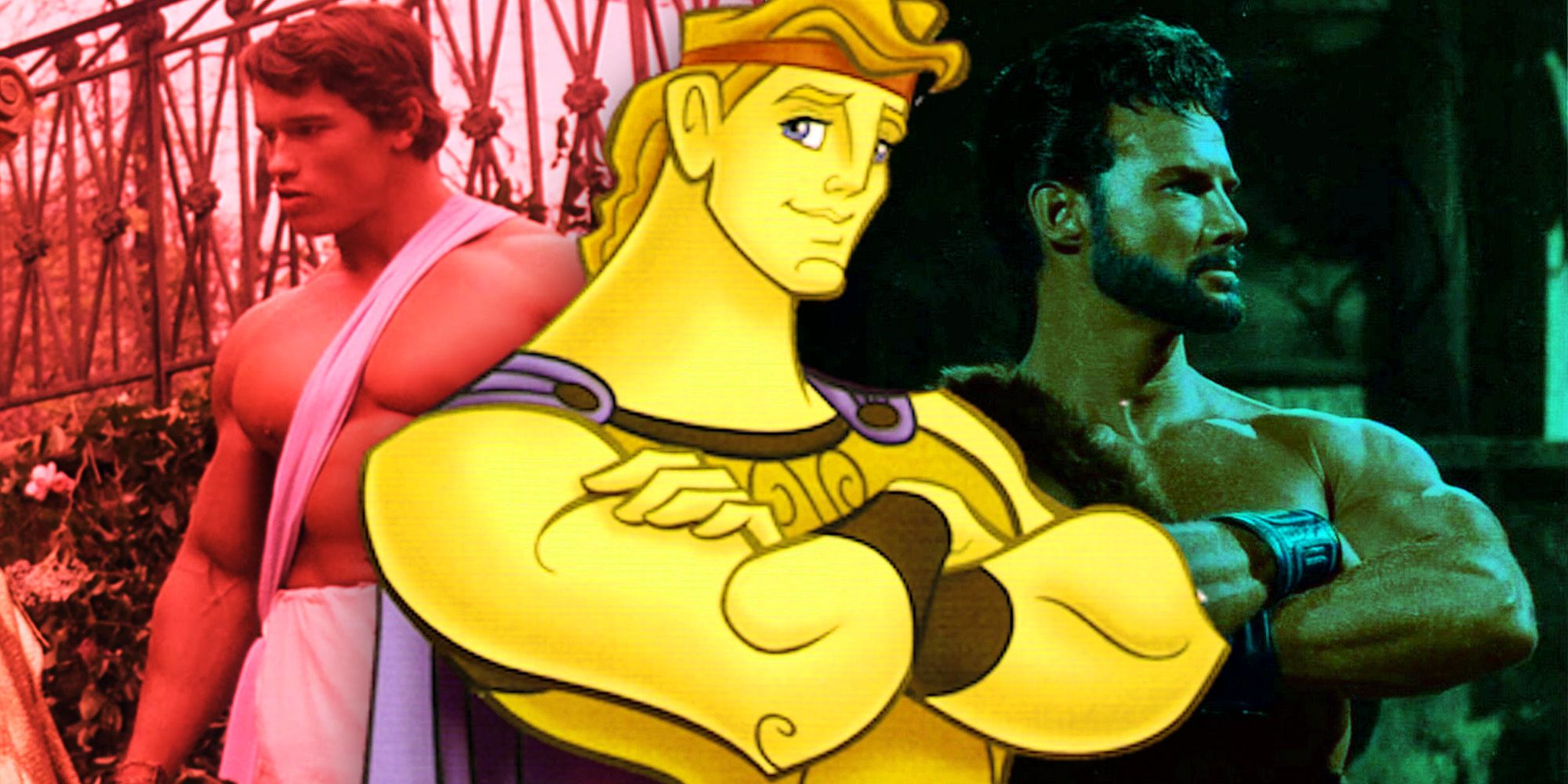
Related
10 Best Hercules Movies, Ranked
Filmmakers have brought the legendary Hercules to life in a variety of movies, turning the Greek hero into a star of some amazing films.
Support Group Olympus (2021)
2021’s Support Group Olympus is an interesting addition to the wider Greek mythology movies canon. Much like the TV shows American Gods and the 2024 Netflix series Kaos, Support Group Olympus takes several staples of Ancient Greek myth and supplants them in the modern world. Specifically, this indie film by director Jimmy Francis examines a handful of Greek Gods still existing in the modern era.
However, since they have no powers and must integrate into normal society well enough to receive welfare checks, they attend group therapy. It’s an interesting concept that’s certainly worth a watch to any fans of Greek mythology movies who enjoy elements of the classic setting being mixed with the present day. Seeing the likes of Hermes, Dionysus, Aphrodite, Ares, and Athena attempt to navigate life in the 21st century without their godly gifts makes for a unique movie about the Greek Gods, though it doesn’t contain any of the swords and sandals action of many epics actually set in Ancient Greece.
The Trojan Horse (1961)
Like many of the honorable mentions among the best Greek mythology movies, 1961’s The Trojan Horse from Italian director Giorgio Ferronia will likely only appeal to the most ardent fans of the sword and sandals genre (and even then, mostly those who enjoy the specific era of mid-20th century historic epics). However, for this particular demographic, this Ancient Greece movie starring Steve Reeves, Juliette Mayniel, and John Drew Barrymore is almost guaranteed to entertain.
The Trojan Horse is an adaptation of the final year of the Trojan War, a conflict that’s been portrayed dozens of times on both the big and small screen. The 1961 version doesn’t do much to reinvent the wheel, though it ticks every box that fans of the subgenre and era will want to see filled. The set design is ambitious and endearingly 1960s, and both the performances of the cast and Ferroni’s directing still hold up despite over 50 years passing.
The Colossus Of Rhodes (1961)
Italian director Sergio Leone may be most known for his Western movies (especially the Dollar trilogy starring Clint Eastwood), but he was far from limited to the world of cowboys and six-shooters. He also made a great movie based on Ancient Greek mythology, 1961’s The Colossus of Rhodes. By the standards of the time it was released, The Colossus of Rhodes is a true blockbuster epic with all the retrospective charm that the greatest mid-20th century historical movies offer.
While it, of course, seems dated by the standards of the 2020s, The Colossus of Rhodes remains a testament to what filmmakers were able to visually achieve prior to the arrival of CGI. Contemporary critics found the two hour runtime a little difficult to digest, and the story itself is admittedly far from the most engaging both within the realm of Sergio Leone’s work and Greek mythology movies. However, for fans of the sugenre, it’s definitely worth a watch, especially given how it clearly influenced other movies that followed in the decades since.
Hercules And The Conquest Of Atlantis (1961)
British model and bodybuilder Reg Park played Hercules five times throughout his acting career, and it was literally the only character he ever portrayed on the screen. This especially acute streak of typecasting began in 1961’s Hercules and the Conquest of Atlantis, which was released in the US under an alternate title, Hercules and the Captive Women. As can be guessed from the movie’s name, Hercules and the Conquest of Atlantis is primarily about Hercules conquering the ancient lost city of Atlantis.
Hercules and the Conquest of Atlantis is textbook mid-20th century sword and sandals cinema, and so is more than worth a watch for many fans of Greek mythology movies. The plot is also pretty inventive as far as the subgenre and era go, with director Vittorio Cottafavi opting to use elements of Greek legend to tell a new story, rather than simply adapting a classic tale. This film about Ancient Greece also featured in an episode of Mystery Science Theater 3000, which should give potential viewers an idea as to its specific kind of appeal.
The Bacchantes (1961)
Italian cinema was experiencing a golden era in the 1960s, and while this is mainly remembered in the present day due to the popularity of Spaghetti Westerns and the influence of Italian filmmaker on cowboy movies, the nation’s directors also created some timeless Greek Mythology movies. One of the best examples comes in the form of 1961’s The Bacchantes by director Giorgio Ferroni, the filmmaker behind The Trojan Horse (which released the same year).
Based on the Euripedes tragedy The Bacchae, The Bacchantes sees the great city of Thebes plagued by a terrible drought which, according to a prophet, is born of the wrath of the god Dionysus. It’s a darker and more emotional tale than The Trojan Horse, and didn’t see release outside of Italy and France for several decades. The Bacchantes isn’t the most accessible movie about Ancient Greece, but it remains recommended viewing for fans of Giorgio Ferroni’s work specifically, and remains a highlight of his work in the realm of sword and sandals movies.
Alexander (2004)
Something of a controversial film from the otherwise respected director Oliver Stone, 2004’s Alexander was panned upon release. However, it has since developed something of a cult following, with some now electing to see the film as an allegorical biopic about Stone himself. Starring Colin Farrell, Angelina Jolie, and Jared Leto, Alexander sometimes comes across as tedious and long-winded. It was a box office bomb at the time of its release and received Razzie Awards nominations.
Based on the book
Alexander the Great
, the movie has received both praise and criticism for its accuracy of the Greek myths.
However, its epic battle scenes and aggrandized interpretations of the legendary Greek leader make it one of the more worthwhile Greek mythology movies. Based on the book Alexander the Great, the movie has received both praise and criticism for its accuracy of the Greek myths. Stone consulted an Oxford historian for the movie and faithfully recreated things like the Battle of Gaugamela. However, critics pointed out the troublesome Orientalist notions about Eastern societies.
Minotaur (2006)
Minotaur is a very loose retelling of a famous Greek myth. The horror film stars Tom Hardy and is set during the Iron Age. A woman conceives a child with an animal, and that child becomes the Minotaur, which a village worships as their god. They imprison the beast inside an underground labyrinth, and every few years, the village must sacrifice several people to the beast. After Theo’s girlfriend is sacrificed, he learns she might still be alive in the labyrinth and volunteers to replace a chosen victim to go in to save her.
The movie received mixed reviews from critics, with most calling it a mediocre horror movie. As for the accuracy to Greek myths, this movie just used the classic Minotaur mythical creature to create a horror movie villain that the heroes have to survive. The labyrinth is accurate to the legends, as is the idea that a woman conceived a child with a bull and created the Minotaur. However, the defeat of the Minotaur was a little too easy, as only Theseus could kill it in the myths.
Clash Of The Titans (2010)
Clash of the Titans received a lot of hatred upon its release. The original film was generally a Ray Harryhausen spectacle featuring incomparable claymation wizardry. As a result, the modern CGI monsters seem to lack some of the original Greek mythology movie’s charm. Further, the original focused much more on the gods and their chess matches regarding humanity. The relationship between humans and the gods took precedence.
This flashy remake can be fun, with some dazzling realizations of Claymation that might be inaccessible to newer audiences. The action has some decent verve, but the plot is somewhat rushed, and character development isn’t there. The movie is not as beloved as the first release, thanks to the missing charm of Ray Harryhausen, and the story itself is a little too reliant on the big action scenes, CGI, and 3D gimmicks.
Wrath Of The Titans (2012)
Wrath of the Titans is the sequel to the 2010 film Clash of the Titans. Unfortunately, it was mostly panned by critics, but it still has its share of fans who enjoy it just for its silliness. For fans of Greek mythology movies, it’s worth checking out at least once to see some of the monstrous beings fight. It takes place a decade after the events of the first film, with the gods losing their hold over the legendary Titans. Perseus must rescue Zeus and save the human race by defeating the Titans.
The movie brings back most of the cast from the first movie, although Jonathan Liebesman replaced Luis Leterrier as the director. Wrath of the Titans follows up the story from the first movie, so it veers strongly from the original Greek myths and tries to stretch out the story to create a trilogy of Greek mythology movies. However, it didn’t work out as this was a box office and critical failure, and the studio canceled Revenge of the Titans, which was supposed to finish off the trilogy.
Percy Jackson Movies (2010, 2013)
Many fans of the original books reject the Percy Jackson movies because they changed a lot from the Rick Riordan novels. That said, fans who haven’t read the books or are able to separate them from the story the movies tell may enjoy them as the fun popcorn flicks they are. There are only two of them, starring Logan Lerman, Jake Abel, Brandon T. Jackson, and Alexandra Daddario.
The Greek mythology movies follow Percy Jackson (Lerman), a demigod who trains at a camp with other demigods his age, and the adventures Jackson is forced to go on in the process. While the original wasn’t one of the best Greek mythology movies, a rebooted Disney+ Percy Jackson series has fared better with fans so far. The movies play loose with the actual Greek myths, but since this is made to get young adults interested in the fables, it works perfectly as a launching point for the Greek gods and demigods.



